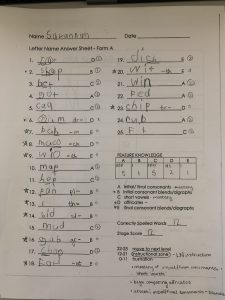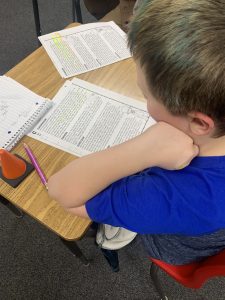What is InTASC Standard #1: Learner Development
Understanding learner development means embracing the whole child in their academic journey. The developmental model of learning identifies the strengths and difficulties of childhood growth. Teachers use the developmental framework to project areas for instruction and scaffolding. In understanding the natural curiosities and confusions of young children, teachers understand how to challenge students appropriately. It also accounts for the needs of the whole child–in terms of their emotional, cognitive, and physical growth–that informs modifications and accommodations that teachers employ for the success of all students.
Artifacts for InTASC Standard #1:
The Developmental Spelling Analysis (DSA)
The Development Spelling Analysis (DSA) diagnoses the stages of spelling development in two parts, the screening inventory and the feature test. The DSA operates based on research that shows children’s spelling development from invented spellings to applying generalizations like vowel patterns to forming connections between word meanings and sound patterns. This resource identifies the strengths and needs of students to support instructional planning. For example, administering the DSA at the beginning of the school year helps teachers differentiate small reading groups because the assessment scores highlight features that students are using but confusing.

Virginia Kindness Week
The week of February 13th is Virginia Kindness Week, a movement that aims to create healthy school communities through small acts of kindness. In my fourth grade classroom, we celebrate Virginia Kindness Week with morning work activities. On Monday morning, the students list the acts of kindness they can show at school and at home throughout the week for the Kindness Week Challenge. On Friday, the students discuss their acts of kindness and publish their completed Challenge Board on social media. Virginia Kindness Week relates to learner development as students demonstrate social-emotional awareness. Through acts of kindness, students will reflect on their relationships to their families, their classroom, and their community.

Dyslexia Awareness Module
The dyslexia awareness module certifies instructors to appropriately support the needs of students with dyslexia. In this module, teachers learn to identify students with dyslexia and recognize that dyslexia is a condition affecting the child’s ability to correspond letters and sounds. Dyslexia directly impacts learner development because students with dyslexia need additional support to become strong readers. My dyslexia awareness training has helped me understand what types of support students need. For example, in the early phase of my student teaching, I worked individually with students with IEPs to become involved in the classroom. I helped students by reading worksheet instructions and questions aloud, and challenging them to use the decoding skills they practiced in their reading block. This artifact demonstrates the significance of InTASC Standard #1 because it helps teachers understand the students’ unique path of cognitive development, which also equips teachers to provide resources and differentiated instruction.
